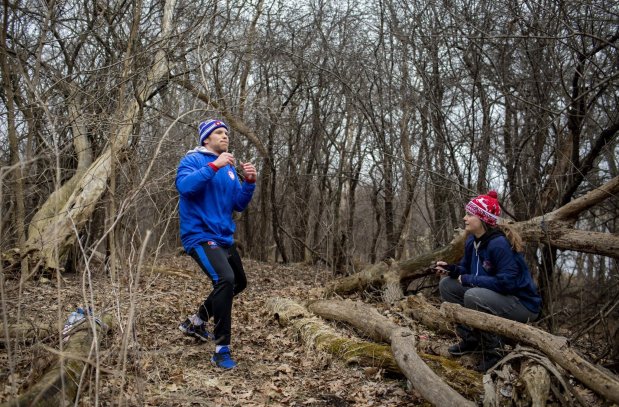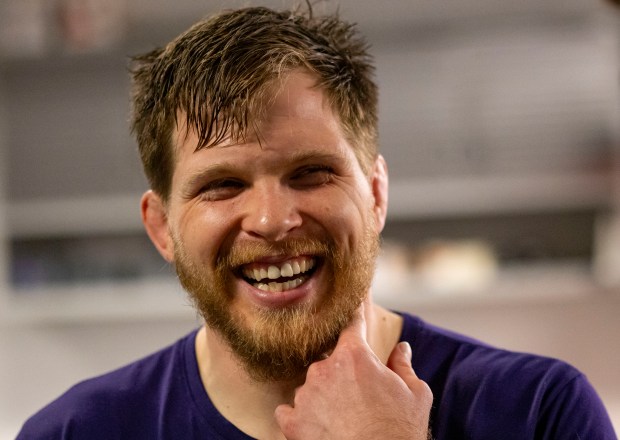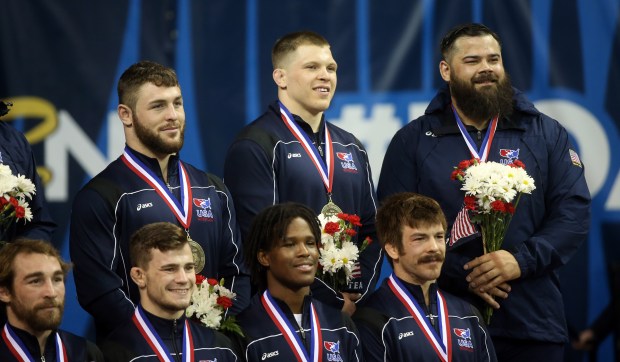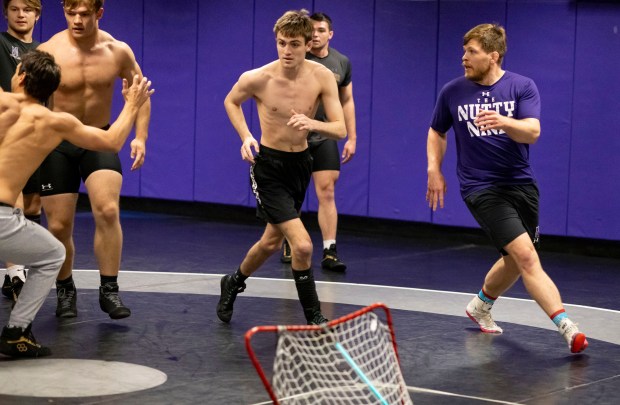After finishing second at the Olympic trials in 2021, Joe Rau took off his tattered shoes and left them on the wrestling mat as a stunned crowd watched.
This is how Greco-Roman wrestlers announce their retirement. It’s how they tell the world that they have nothing more to give.
It was a rash decision, spurred by controversial refereeing and a heartbreaking defeat that kept Rau off the U.S. Olympic team once again. At that moment — and for many months after — the idea of wrestling again sickened the Elmhurst College graduate.
“I get a pit in my stomach like I’m going to throw up if I just think about wrestling,” the Union Ridge native told the Tribune a few weeks after the loss. “It’s devastating because wrestling has been the thing I’ve loved most since I was a kid. It’s what I do. It’s what I know.”
Rau let the sadness and the bitterness envelop him. He had no job, no money and — for the first time since he joined a local wrestling club at age 6 — no real purpose.
He spent several weeks camping with his wife in Alaska’s Denali National Park after the trials and tried to figure out his next move. The solitude — and the sheer distance from his former life — suited him so well he grew a beard, took a job in a coffee shop and planned to move north.
At Northwestern University, where Rau had been training for the past several years, head wrestling coach Matt Storniolo came up with a competing offer: He asked Rau to join his staff as an assistant, to find a better way to deal with his disappointment.
“It was like he had lost part of his soul,” Storniolo said. “I thought it might ease the pain if he was out there helping younger wrestlers. I thought maybe he could find a different way to love the sport.”
In September 2021, Rau walked into the Northwestern wrestling room just to see how it would feel. It was the first step in an improbable journey that ended last month with him earning a spot on the U.S. Olympic Team at age 33.
“It doesn’t feel real,” Rau said. “I’m still a little paranoid that it’s going to be taken away from me or I’m going to get hit by a car. But I’m starting to get used to it, and it feels amazing.”
Few people could have predicted this outcome for Rau, whose 27-year career has been defined by both gut-wrenching losses and his ability to defy expectations.
An all-conference wrestler at St. Patrick Catholic High School in Chicago, he only qualified for the state tournament once in four years. During his sole appearance as a senior, he was pinned in his first match and lost 7-2 in the consolation round.
Still, Rau had built enough of a resume to be recruited by Elmhurst College, a NCAA Division III school in the west suburbs. He thrived there, becoming a four-time conference champion, three-time All-American and the Division III champion in the 184-pound weight class his senior year.
Conventional wisdom would have suggested his athletic career would have ended there.
“Not many D-III wrestlers go on to make the world team,” said Bryan Medlin, director of operations for the University of Illinois wrestling program. “But most wrestlers aren’t Joe Rau.”
Shortly before graduating college in 2013, Rau told his parents he wanted to compete on the international level. He laid out a plan, detailing how he would be a Greco-Roman wrestler — a style different from the one he competed in throughout high school and college — and sharpen his skills at one of USA Wrestling’s regional training centers.
If all went well, he told his parents, he could make the 2016 Olympic team.
And he came so close to executing his plan. So very, very close.
In 2016, Rau won the U.S. Olympic trials but he did not compete in the Rio Games because no American wrestler in his weight class had finished high enough in international competition to secure a spot in the tournament. He went instead as a training partner for one of his teammates, watching from the stands as other people realized his dream.
He decided to keep training for another four years, a quadrennial in which every decision was made with the 2020 Olympics in mind. He was in the best shape of his life heading into the trials, having won the U.S. Open and the Pan-Am Championships.
In early March 2020, he won the Pan Am Olympic Qualifier in Canada, securing the United States a spot in the 87-kg weight class in Tokyo. If he won the trials, he’d punch his own ticket to the Olympics.

Less than three weeks later, however, a pandemic brought his training to an abrupt halt and the Tokyo Games were postponed until 2021. With Northwestern’s training facilities closed, Rau passed the time by jogging in his neighborhood and practicing wrestling moves with his then-girlfriend (and now-wife) Astrid De Leeuw, who was a fraction of his size but not subject to social distancing rules.
“I’ve been thrown around by life and wrestling,” he told the Tribune at the time. “I know how fragile everything is. Nothing is given easily and nothing is guaranteed.”
His words proved prophetic a year later at the 2021 trials. Before the finals began, Rau and his team asked for another referee to oversee the best-of-three series because the assigned ref had ties to his opponent’s wrestling club. The request was denied, and Rau dropped the first match after a series of controversial decisions.
The loss sent Rau into a spiral in which he convinced himself he had no chance at the Olympics and his dream had been stolen. Medlin, his primary coach at the time, tried to comfort Rau, agreeing with him that what happened was unfair but encouraging him to get back out there and win the next match.
“I have spent the past three years replaying that moment in my mind and wishing I had handled it differently,” Medlin recently told the Tribune, as his voice choked with emotion. “I should not have tried to comfort him. I should have been tougher.”
Unable to get his emotions in check, Rau lost 2-1 in the second match and watched his opponent claim the Olympic spot that Rau secured for the United States.
“It was heartbreaking for not just him, but for all of us,” De Leeuw said. “We all knew how hard he worked and how much he wanted it. Everything just went awry.”
Rau appealed the result, but lost. With the Olympics fully out of reach, he headed toward Alaska and a future without wrestling.

He reluctantly changed his mind when the Northwestern job came along because it came with solid benefits. As part of his duties, he worked with two-time All-American Lucas Davison.
“I literally had to get in good shape just to be a good training partner for him because he’s a beast,” Rau said. “And then it was like, well, I’m doing the hard part by getting in shape. Competing is the fun part. I might as well show up and see what happens.”
In May 2022, Rau competed in freestyle at the U.S. Open and surprised everyone by finishing second. It didn’t take too long for Team USA’s Greco-Roman coaches to reach out and ask him to come back.
“I told them no about three times, I think,” Rau said. “Then I just really did some soul searching and I talked to my wife. She said, if you really want to, I’m not stopping you.”
Rau won the 2023 U.S. Open in the Greco-Roman division and then took the Senior Pan Am Championships at 97 kg. His comeback solidified, he left Northwestern and moved to the U.S. Olympic Training Center in Colorado, where he could focus full time on the sport, receive daily treatments on his aging body and work with a sports psychologist.
De Leeuw, a native of Belgium, had just received her green card and remained in the Chicago area to work.
In December 2023, Rau finished second at the national championships to Alan Vera, a Cuban-born wrestler who defected to the United States in 2016. Vera later earned an Olympic berth for the U.S. with his placement at the 2024 Pan American Olympic Games Qualifier.
Rau responded to the loss by flying to Europe and training with Greco-Roman wrestlers across the continent.
“My coaches thought I was crazy. They kept telling me ‘no,’” Rau said. “But I really wanted to do it and so, finally, they agreed.”
Rau, who receives a $1,100 monthly stipend from USA Wrestling, paid for the three-month trip with help from his wife, a better-than-expected tax return, a small amount of money his parents inherited after his grandmother’s death and credit cards.
He traveled as cheaply as possible, staying with a French wrestler’s family in France, receiving discounted training camp fees from the German and Norwegian teams and bartering reduced room rates from the Bulgarian Wrestling Federation. He says he became so skilled at finding discounted airfares he began wondering if he missed his calling as a travel agent.
“I’ve always been the kind of guy that didn’t want to let money get in the way of my dream, even if I had to go into a crazy amount of debt,” he said. “I’ve had a history of sleeping on couches and doing whatever it takes to get out to the right places and with the right people. I feel like that has paid dividends.”
Rau returned from Europe with a swagger and a sense of optimism he hadn’t felt in years. He was feeling so good, in fact, he selected “I Just Can’t Wait to Be King” from the “Lion King” as his walk-in music at the Olympic trials. The peppy Disney tune stood in stark contrast to the hard rock and rap songs the other wrestlers use, but his wife found comfort in the selection.
“That was a very Joe thing to do,” De Leeuw said. “He had done so much work mentally since 2021 and I knew no matter what happened, he would be OK.”
Rau’s confidence waned, however, when he met Vera — whom he had never beaten — in the finals. He lost to Vera in the first match and found himself nearly paralyzed by self-doubt.
“To be honest, I felt like I was cursed,” Rau said. “It felt like ‘here we go again.’ I was in a negative loop.”

Medlin, who was serving as Rau’s secondary coach at the trials and had known him since he was 18, immediately recognized the tailspin. He was not going to let history repeat itself.
He didn’t try to comfort Rau like he did in 2021. Instead, Medlin spoke firmly about their strategy and reinforced his belief that whoever won the second match would win the series.
Rau, at first, wouldn’t listen. He hung his head and refused to make eye contact.
Desperate to reach Rau, Medlin grabbed him by the trapezoid muscle and squeezed so hard the wrestler looked up at him. Medlin told him to pull himself together because they knew how to beat Vera.
“I said what I should have said three years ago,” Medlin said. “His face just completely changed, and I knew I had broken through to him. I could tell he was listening.”
That turning point is etched in Rau’s memory, as well.
“I was caught in a negative loop and he couldn’t break through to me,” he recalled. “But then I told myself, ‘no, he’s right. Be open to the positive stuff he’s saying.’”
Rau won the second match 6-0. He scored a technical fall — Greco-Roman wrestling’s version of the slaughter rule — in the third, clinching his spot on the U.S. Olympic team.
He had waited years for this moment, but Rau did not celebrate on the mat. He crouched down next to Vera, hugged him and said, “I’m sorry.”
“He qualified that Olympic spot for the United States, and I took it,” Rau said. “I know how that feels.”
It has been two weeks since Rau qualified for the Olympics. It has been a heady time, filled with media interviews, Team USA swag and fundraising efforts to pay for his family’s trip to Paris. He also found time to post photos of his celebratory meals on his food-centric Instagram account, @ChowwithRau, which chronicles the gastronomic adventures of a wrestler who seemingly never worries about cutting weight.
In between the trials and his national team duties, Rau flew home to Chicago and spent a recent afternoon training with the Northwestern wrestling team. He was greeted with bear hugs and back slaps, embraced once again by the program that helped him heal and put him on a path toward Paris.
Having made the Olympic team, Rau has two goals for the upcoming Games.
One more important than the other.
“The goal is to be a gold medalist,” he said. “But the main goal is to be happy. And, you know what? I’m pretty happy right now.”





